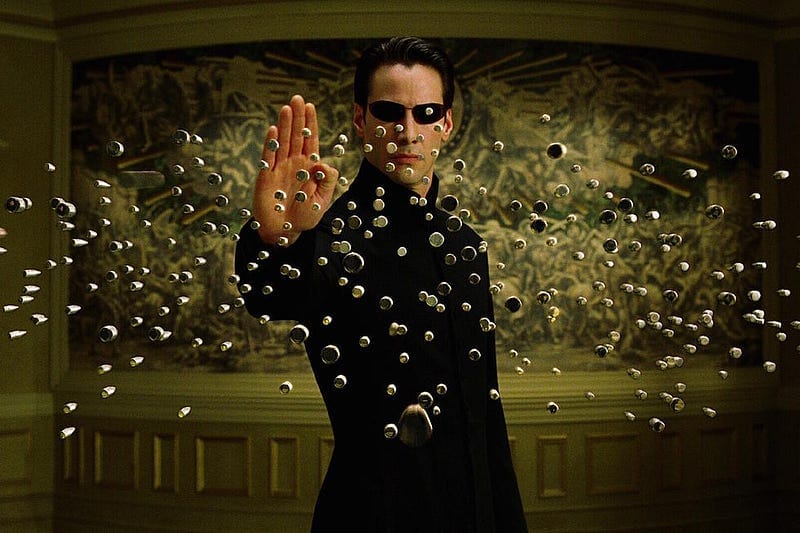The Matrix Reloaded (2003) | a belated review
I want to speak about a film I recently rewatched for the first time in years: The Matrix Reloaded. This is a fact I’m sure some of you do…

I want to speak about a film I recently rewatched for the first time in years: The Matrix Reloaded. This is a fact I’m sure some of you do not consider right and normal. Who on earth would want to watch The Matrix Reloaded more than once? Well, me. I liked it, and I don’t care that many other people didn’t.
Watching The Matrix Reloaded again made one thing that always bothered me a bit clearer: “the one as just another instrument of control” stuff. The Matrix (1999) has a basic messianic plot where the main question is whether or not Neo is actually the One, a free human with unexplained ability to control the matrix because of his greater insight into the falsity of its virtual reality, or rather conscious insight of its reality as virtual. He’s basically a mix of hacker, superman, and Jesus.
In the sequels, we find that the One is actually a known quantity by the machines. The Resistance and the One are necessary products of an “equation” that the Architect, machine designer of the Matrix, seeks to balance. The Architect explains to Neo-in abysmal pseudo-intellectual dialogue, like Stephen Fry vomiting a thesaurus-that in order to keep human inmates sane, they are given an unconscious choice whether to be a part of it or not. The small fraction who chooses not eventually free themselves and organise in the underground city of Zion.
Though the process has altered your consciousness you remain irrevocably human. Ergo, some of my answers you will understand and some you will not. Concordantly, while your first question may be the most pertinent, you may or may not realize it is also the most irrelevant. — The Architect “speaking”
When the system produces the One as an inevitable flaw emanating from free will, it appears to Zion to be a way of fighting the machines and a path to final victory. In reality, the One is expected to return to the machine mainframe, “the Source”, from where his power comes and collaborate in the destruction of Zion in order to prevent the genocide of humanity.
Forgive me if I was just a bit stupid, but as a fourteen-year-old, I didn’t not even nearly understand any of that. I still find the “return to the source” stuff a bit strange. But, one thing I did understand a bit more after watching it again was its political meaning, deliberate or not. And, I think I only really understand this after Snowden and PRISM.
The liberal hippy geeks who invented the internet have been surprised to find that the creations they produced for the democratic good of humanity have been to some extent used to erode that freedom. The Matrix Reloaded tells us something about that problem. What appeared to be an instrument of salvation, as with the home computer “revolution”, was, in virtue of the fact that it had its “source” in our prison (which I guess for liberal hippies is the state), was just another instrument of control.
In embracing this role within the system, Neo became an unwitting collaborator, as did Silicone Valley, the Free Software Foundation, and the Open Source Community — I am reminded of Stewart Lee’s description of Twitter as “a state surveillance service run by gullible volunteers, a Stasi for the ‘angry birds generation’”. Just as the state funded technology, developed for military purposes, is used by the state as a means of control so the One contained the risk of total domination of human freedom.
It is banal to point out that dystopian Sci-Fi contains a warning. The Terminator and Logan’s Run warned us about giving too much power to machines, and Star Trek V: The Final Frontier warned us what happens when you let William Shatner direct something. The Matrix Reloaded’s warning is that what is given to us by a dangerous political context as a means of salvation is, by necessity, yet another danger.
This is an updated version of a review I first published on September 10, 2015 on an old blog.
